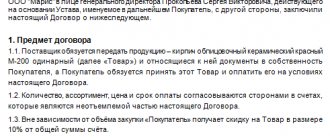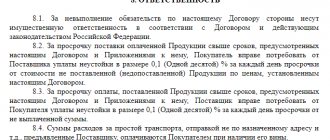When concluding purchase and sale transactions, a number of nuances arise. Therefore, now we will consider the essential terms of the supply agreement under the Civil Code of the Russian Federation: we will figure out which points are considered main and secondary - so that you understand what to focus on and how to formalize the obligation relationship with maximum benefit for yourself.
Note that any contract is a set of clauses agreed upon by the parties. It also contains a preamble, details, legal addresses and is certified by signatures. With a competent approach, it is drawn up taking into account not only current regulations, but also the practice of arbitration courts (in order to prepare in advance for the settlement of disputes). This is in the general case, and we are already moving on to particulars.
What is a supply agreement
This is a document that describes the obligations of the seller and buyer of any item purchased for use for consumer, commercial or other purposes. The role of the seller can be either an organization of any OPF or an individual entrepreneur. If the provisions agreed upon in this contract are not observed in practice, it will cease to be valid. From a legal point of view, it is regulated on the basis of the provisions of paragraph 3 of Chapter 30 of the Civil Code of the Russian Federation. To maximize the protection of your interests, it is worth drawing up and concluding it with the help of an experienced lawyer.
How to make changes to existing contracts
ConsultantPlus has ready-made solutions, including how to change the contract during the COVID-19 coronavirus pandemic. If you don't have access to the system yet, sign up for a free trial online. You can also get the current K+ price list.
If the agreement was concluded before the pandemic, it does not contain instructions on the procedure for fulfilling obligations under coronavirus conditions. If legal restrictions really affect the possibility of executing the contract, it is worth including amendments to it that determine the procedure for working during a pandemic. To do this, you will need to conclude an additional agreement.
The agreement must indicate:
- details of the agreement, the terms of which are being amended;
- additional conditions that will regulate the procedure for fulfilling obligations during the pandemic;
- the date of the agreement and its validity period.
The agreement is signed by both parties who entered into the main agreement.
Terms of delivery under the contract
The rules for creating this document are regulated by Article 432 of the Civil Code of the Russian Federation, according to which it comes into force after reaching an agreement on all essential points and affixing signatures. All its legal aspects are regulated by the already mentioned Chapter. 30 Federal Law No. 14.
There are several variations of it:
- one-time or providing for regular delivery of specified objects over a long period of time;
- extending to one type of item or a group of items, for example, a specific model of a body part or their entire range;
- with a concise accompanying description or filled with detailed reviews and complex technical characteristics, with a range of applications.
And all of them have the following features:
- in any case, they legitimize the commercial transaction between the supplier and the buyer, that is, business entities;
- focus on products not intended for the personal use of either party;
- are concluded for mutual benefit;
- describe objects that have a certain economic value - those things that can be realized (or business processes can be organized with their help).
Results
So, in order to avoid having to pay fines and penalties for failure to fulfill obligations under contracts due to restrictions related to the spread of coronavirus infection, it is necessary to include a corresponding condition in the contract.
If it was concluded before the pandemic, changes can be made by concluding an additional agreement with new conditions. You can find more complete information on the topic in ConsultantPlus. Free trial access to the system for 2 days.
Ready-made solutions for all areas
Stores
Mobility, accuracy and speed of counting goods on the sales floor and in the warehouse will allow you not to lose days of sales during inventory and when receiving goods.
To learn more
Warehouses
Speed up your warehouse employees' work with mobile automation. Eliminate errors in receiving, shipping, inventory and movement of goods forever.
To learn more
Marking
Mandatory labeling of goods is an opportunity for each organization to 100% exclude the acceptance of counterfeit goods into its warehouse and track the supply chain from the manufacturer.
To learn more
E-commerce
Speed, accuracy of acceptance and shipment of goods in the warehouse is the cornerstone in the E-commerce business. Start using modern, more efficient mobile tools.
To learn more
Institutions
Increase the accuracy of accounting for the organization’s property, the level of control over the safety and movement of each item. Mobile accounting will reduce the likelihood of theft and natural losses.
To learn more
Production
Increase the efficiency of your manufacturing enterprise by introducing mobile automation for inventory accounting.
To learn more
EGAIS
Eliminate errors in comparing and reading excise duty stamps for alcoholic beverages using mobile accounting tools.
To learn more
RFID
The first ready-made solution in Russia for tracking goods using RFID tags at each stage of the supply chain.
To learn more
Certification for partners
Obtaining certified Cleverence partner status will allow your company to reach a new level of problem solving at your clients’ enterprises.
To learn more
Inventory
Use modern mobile tools to carry out product inventory. Increase the speed and accuracy of your business process.
To learn more
Mobile automation
Use modern mobile tools to account for goods and fixed assets in your enterprise. Completely abandon accounting “on paper”.
Learn more Show all automation solutions
What adjustments has the pandemic made?
The spread of coronavirus infection has caused massive non-fulfillment of contracts - due to the closure of borders and the suspension of the activities of enterprises, not everyone was able to deliver goods or provide services on time.
Many companies tried to recognize the current situation as force majeure - some succeeded, others did not. Those performers who could not prove that the pandemic was the reason for the violation of deadlines for fulfilling obligations had to pay fines and penalties. This measure of liability is provided for in almost every contract.
In order not to become a victim of circumstances in the event that a new wave of coronavirus causes a second lockdown, many companies are changing the content of contracts - both newly concluded and existing ones. It is important to correctly formulate the conditions under which the impossibility of delivering goods due to coronavirus will not entail penalties for the contractor.
What conditions are not considered essential?
Those without whose approval the document will be concluded. But this does not mean that they should be ignored or given a small role - they should be given attention, and in some cases one of them can become an effective tool for extracting benefits.
Before considering them, let’s say that when concluding a transaction it is always worth checking the nuances of acceptance, quality assurance and the specifics of the parties’ responsibilities. To reduce your own risks, it is advisable to fix the volume and nature of the payment of a penalty (monetary or in kind) in the event of failure to fulfill obligations. Well, now let's move on to the minor nuances.
Payment
The essential (mandatory) terms of the supply contract are those regulated by legislative acts. The price and method of mutual settlements do not fall under this category; they are not regulated by the rules and regulations of the Federal Law. They are fixed by price lists, tariffs, price lists and other offers, usually coming from the supplier. But the customer also has the right to take the initiative.
Today, the choice of the option for transferring funds, as a rule, remains with the buyer: he decides what is more convenient for him, making a 100% advance payment or, for example, making a one-time transfer of money. In an effort to attract customers, sellers often promise the possibility of installment plans and even develop an individual schedule convenient for the other party.
Procedure for providing products
Here you need to take into account what refers to the essential terms of the contract for the supply of goods under the Civil Code of the Russian Federation. Article 508 quite specifically defines this point: if items will be delivered in batches, but the exact dates of their receipt are not specified in the contract, it is understood that the items will arrive in equal monthly installments (unless legal acts, Federal Laws or generally accepted practice imply something different).
Naturally, this is not always convenient. This format is not suitable when the lion’s share of the property for sale is needed in a short time or it is not possible to wait six months. Therefore, it makes sense to record this point and clearly outline the time intervals for fulfilling obligations.
Insurance
Protect your supply agreement from risks: the essential condition of the document is the object of the transaction, but not the associated costs of obtaining it. In practice, this means that the parties have the right to divide the costs of issuing a policy equally or to the extent that each of them agrees. This is the point in the contract where you can look for and need to find a compromise. But with the right approach, it will be possible to strengthen business relationships, make them more trusting, and show a focus on long-term cooperation.
Transfer procedure
Including this item greatly simplifies the receipt of items and therefore increases customer loyalty. Clarity on this issue is also convenient for the seller. Judge for yourself: is the place of delivery of goods an essential condition? According to regulations, no, but if the seller knows exactly where to deliver the shipment, this will help avoid confusion and overlaps.
In addition, the customer will be able to prepare for acceptance in advance, and this will also help save time and speed up the closing of the transaction. Therefore, such points as date, hour, address also deserve attention, and it is better to include them in the documentation to avoid misunderstandings. And vice versa: if you do not include these points, the second party will have leverage over the situation and the opportunity to turn it in its favor, for example, artificially delay the delivery of products, explaining that they were delivered to the wrong place.
We remind you that all these are additional points, the absence of which in the text of the document does not result in the invalidity of the contract.
Penalties
This section in the contract is actually not taken into account by the parties. Although it is precisely because of this point that if you disagree with the counterparty’s sanction, the company will incur costs for legal services. In this situation, you cannot do without the help of a professional. The lawyer will need to analyze the delivery documentation, prepare a reasoned response to your counterparty and, if the latter refuses, represent your interests in court. As you can see, the company may suffer serious financial losses, so do not ignore this section of the contract.
Penalties are divided into two types: penalties and fines. The penalty is paid for each day of delay in delivery of goods/payment/replacement of goods, etc. If the contract provides for an advance payment and a final payment, then it is possible to provide for liability in the form of a penalty for late payments, both for each payment and separately.
Let's give an example, let's say the contract price is 500,000.00 rubles.
You are a supplier and the delivery is 10 days late, and the penalty in the contract is 0.5% of the contract price; accordingly, you will be charged a penalty of RUB 25,000.00 for these days. (500,000.00×10×0.5%). The penalty is quite high for ten days overdue. Therefore, when concluding an agreement, it is necessary to pay attention to the amount of the penalty and the price of the agreement, do not forget about the risk of entrepreneurial activity. It is also always necessary to indicate that the penalty cannot be, for example, more than 10% of the contract price. This wording reduces the amount of the penalty, despite the period of delay of obligations by the party to the contract. In addition, the parties may provide a condition for the buyer to withhold a penalty for violation of the terms of the contract by the supplier from the amount payable for the goods, or a condition for the termination of the obligation to pay the penalty by offsetting a counterclaim.
If there is no agreement in the contract on a penalty for late fulfillment of a monetary obligation, the injured party may demand payment of interest under Art. 395 of the Civil Code of the Russian Federation, as well as recovery of losses caused, having previously proven them.
The fine is specified in the contract in a fixed amount or as a percentage of the contract price. A fine may be specified, for example, for failure to timely satisfy the buyer’s request to replace a defective product. Liability in the form of a fine can be assessed immediately upon conclusion of the contract.
However, if it turns out that the counterparty has presented penalties, do not write off paying them. Read the terms of the concluded agreement. As an example, I will give a case from my practice. The buyer submitted a demand to pay a fine for failure to replace defective goods. The fine was very high, about 2 million rubles. However, after analyzing all the documentation, the supplier sent a response to the claim of refusal to pay a fine due to the buyer’s violation of the conditions for the return of defective goods. Namely: “...under the terms of the contract, hidden defects must be identified by the buyer no later than 14 calendar days from the date of delivery. Moreover, if such a deficiency is identified, the buyer is obliged to notify the supplier by telegram and call his representative so that the parties can draw up a report on the identified deficiencies.” However, in this situation, the buyer not only filed a claim 2 months after delivery of the goods, but also did not call the supplier and did not submit a report on the defects. In connection with the Buyer's violation of the terms of the contract, the supplier was not obliged to bear liability in the form of a fine.
There are many such examples in judicial practice, so do not rush to pay penalties and fines if you have any doubts. In this situation, it is better to trust a practicing lawyer and, at the consultation stage, make the right decision to satisfy the counterparty’s requirements contained in the claim.
It must be remembered that Art. 333 of the Civil Code of the Russian Federation regarding the reduction of penalties has not been canceled. If the dispute has gone to the judicial level, the party to the contract has the right to ask the court to reduce the penalty and provide its explanations why it considers this penalty disproportionate to the consequences of the violation of the obligation.
Random delivery conditions
They mean those items that are included at the discretion of the seller and/or buyer. If mutual understanding is not reached on one, several or all of them, this does not entail recognition of the contract as non-compliant.
The following points can be cited as an example:
- the amount of fines due to failure to meet the delivery schedule or payment plan;
- the container in which the objects will be sent;
- specifics of resolving disputes due to damage, inadequate quality and other violations.
You can compose a preliminary document text (to subsequently show it to the other party) using templates already available on the Internet.
Now that you know the essential (noun) and non-essential terms of the supply agreement and the difference between them, it will be easier to do this. Although we still advise you to use the help of lawyers with the appropriate specialization - this way you will insure yourself against many mistakes. Number of impressions: 6143
General provisions
A supply agreement is a type of purchase and sale agreement, but it does not cover any sale of goods, but only relationships that develop for business purposes or for other purposes, excluding personal, family, and home use of goods.
Supply and purchase and sale agreements are aimed at achieving the same result - the transfer of property into ownership (economic management or operational management) of the acquirer.
However, if, by virtue of a purchase and sale agreement, a finished item (goods) is sold and the execution of the agreement may coincide with the moment of its conclusion, then the supply agreement is concluded for a long period, since the goods that will be supplied have, as a rule, not yet been manufactured, it will be produced (procured) on the basis of the buyer’s order expressed in the contract. Therefore, the supply contract is associated with production (procurement of goods), with the rhythm of the production process. Delivery is carried out in batches within stipulated private deadlines. The quality of the product is determined by state standards or the terms of the contract. Payment is made gradually within stipulated terms (this allows, as it were, to spread the payment in installments and gradually use up the buyer’s working capital). Acceptance of goods under the terms of the contract may be conditioned by the availability of warehouse space of the purchaser.
The rules on sales contracts (for example, in international trade) may apply to a supply agreement, unless otherwise provided by law. The specifics of the supply of goods for government needs are determined by special legislation* and Art. 525 - 534 Civil Code of the Russian Federation.
* See: Law of the Russian Federation “On the supply of products and goods for state needs” dated May 29, 1992 // Gazette of the Congress of People's Deputies of the Russian Federation and the Supreme Council of the Russian Federation. 1992. No. 27. Art. 1558; Federal Law “On State Defense Order” of December 27, 1995 // Rossiyskaya Gazeta. 1996. January 4.
Relations under the supply agreement are regulated by the Civil Code of the Russian Federation.
A supply agreement is a legal form by which production needs for raw materials, supplies, equipment, fuel, etc. are met, and finished products are sold.
A contract for the supply of goods mediates economic ties to promote goods from the sphere of production to the sphere of circulation—to trade.
The supply agreement plays an important role in the implementation of supplies for government needs, since in it the parties express and specify their intention to fulfill it. With the help of an agreement, the state contract is detailed (according to specific deadlines, quantity, assortment and other indicators). Agreement by the parties on the terms of the contract can help correct the imbalance of the order with the actual needs of organizations for raw materials, materials, equipment, etc. Development of the terms of the contract between its participants helps to identify internal production reserves and eliminate non-production costs, improve quality.
By legal nature
The supply agreement is mutual, paid. Both counterparties are both creditors and debtors.
By method of conclusion
the contract is consensual, i.e. The rights and obligations of the parties arise at the moment of signing the text of the agreement.
Subject of the supply agreement
are means of production, consumer goods, extracted raw materials, manufactured materials, fuel. The goods, according to the supply agreement, are delivered in batches as they are manufactured, they are a product of mass or serial production and therefore homogeneous, produced, as a rule, in large quantities, determined by mass, measure, number, quantity. At the same time, the subject of a supply contract can also be individually defined things - experimental machines and equipment, as well as custom-made machines and equipment.
The supply contract is concluded for five years, one year or another period (short-term, seasonal, etc.), taking into account the production and delivery time of the goods, as well as for one-time deliveries. The parties have the right to extend the concluded agreement for a new period.
The execution of a supply contract usually occurs in parts within terms (periods) established taking into account the need for uninterrupted supply to the population and ensuring the rhythm of production. If the contract provides for the supply of homogeneous goods in separate batches, then in the absence of another agreement, delivery is carried out evenly (Article 508 of the Civil Code of the Russian Federation).
Additional check: minimizing all possible risks
The provision of additional information by the counterparty will allow you to avoid unlikely, but extremely unpleasant consequences and simplify the pre-contractual verification. This includes the documents necessary to conclude an agreement with the LLC, which are available upon request:
- a free-form certificate listing basic data (name, contact details, registration and location address, bank details and information about the director, chief accountant, representative);
- information about the owners of the legal entity, its beneficiaries and interested parties;
- confirmation of the authenticity of the signature of the person signing the papers and the director (in such cases, present a copy of the bank card with the signature on the back side).
Subject of contract
It should be emphasized that the contract must clearly stipulate the condition on the subject: the procedure and delivery time, the name of the product. According to paragraph 3 of Article 455 of the Civil Code of the Russian Federation, the terms of the purchase and sale contract for a product are considered agreed upon if the contract allows one to accurately determine the name and quantity of the product. Thus, in cases where the name of the product does not comply with the designation requirements (GOST requirements, etc.), the condition is considered not agreed upon and, therefore, the contract is considered not concluded, since the subject of the transaction has not been agreed upon. These may be, for example, contracts for the supply of petroleum products, in which the name does not meet the requirements stipulated by GOST, and other goods.
For legal entities: the state of the company and the powers of the representative
When working with a legal entity, the counterparty must submit the following documents to conclude a supply agreement:
- Constituent. Presented in the latest edition. The main attention should be paid to what constituent documents are needed to conclude an agreement; this depends on the organizational and legal form of the counterparty (special Federal Law for state corporations, constituent agreement for business partnerships, charter for all other legal entities). We check pages containing information about the name, location, founders (participants), sole executive body of the legal entity, its powers and election procedure.
- Certificate of registration with the tax authority (TIN).
- Extract from the Unified State Register of Legal Entities. We recommend checking that the statement was issued no later than 60–90 days before the transaction date.
- A copy of the decision of the general meeting of members of the company or the collective management body to approve the transaction, if such approval is required by law or charter.
- Power of attorney to carry out activities on behalf of the company (required if the signatory is not the director of the company indicated in the constituent documents). It is recommended to check the powers of the company representative under the power of attorney and its validity period; the power of attorney must clearly indicate which transactions the representative has the right to carry out. The power of attorney indicates the date of its issue and the expiration date of its validity. We take into account that without the expiration date of the power of attorney, such a period is 1 year, and without the date of issue such a power of attorney has no legal force.
- Copies of licenses to carry out licensed activities, duly certified. Their submission is necessary if the specifics of the supply affect activities subject to state licensing.
- Confirmation of the counterparty's right to the property transferred to the second party.
The checklist is suitable for both LLC and JSC, since the list of documents for concluding an agreement with LLC is the same.









